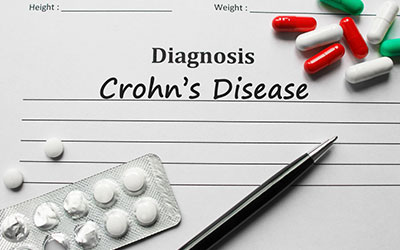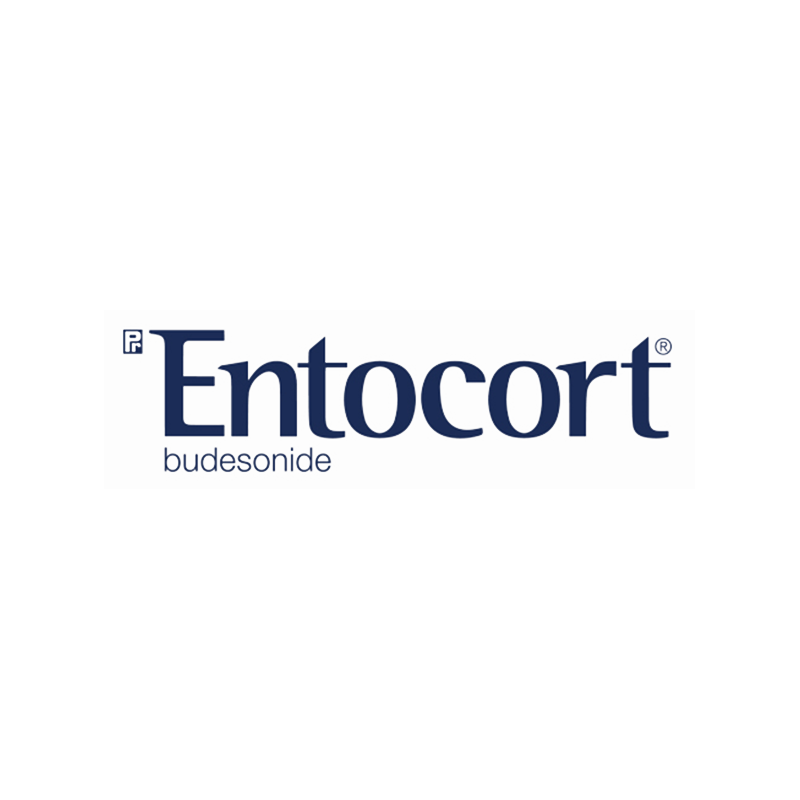Description
Chemical Name: BUDESONIDE (byoo-DESS-oh-nide).
ENTOCORT (Budesonide) is a medication prescribed to treat mild to moderate Chron's disease. ENTOCORT is also prescribed for up to three months of maintenance therapy in Chron's disease to maintain remission.

| Fact Table |
| Formula |
C25H34O6 |
| License |
FDA approved |
| Bioavailability |
Oral: 10-20%; Inhalation: Depends on the device, generally high |
| Legal status |
Prescription drug |
| Chemical Name |
Budesonide |
| Elimination half-life |
2 to 3.6 hours |
| Dosage (Strength) |
Oral capsules: 3 mg; Inhalation powder: 90 mcg and 180 mcg per actuation; Rectal foam: 2mg/dose |
| Pregnancy advice |
Category C (risk cannot be ruled out) |
| Brands |
Entocort, Pulmicort, Uceris, among others |
| Protein binding |
85-90% |
| PubChem CID |
63006 |
| MedlinePlus |
a601042 |
| ChEBI |
CHEBI:3207 |
| ATC code |
A07EA06 (for gastrointestinal use), R01AD05, R03BA02 (for inhalation use) |
| DrugBank |
DB01222 |
| KEGG |
D00246 |
| Routes of administration |
Oral, inhalation, rectal |
Directions
For the treatment of Chron's disease, take one 9 mg capsule by mouth once daily for eight weeks or as directed by your physician.
To maintain the remission of Chron's disease, take one 6 mg capsule by mouth once daily for up to three months or as directed by your physician. The dose may be slowly tapered after three months of treatment.
Ingredients
The active ingredient in ENTOCORT is budesonide. ENTOCORT capsules are enteric-coated (EC) to ensure better delivery to the site of action, the small and large intestines.
Cautions
The use of systemic corticosteroids may suppress the natural production of cortisol. Tell your physician if you have a history of adrenal suppression. ENTOCORT should be tapered to avoid adrenal suppression. Do not discontinue the medication abruptly.
Corticosteroids may increase the risk of infection. Tell your physician before starting ENTOCORT if you have chronic viral, fungal, or bacterial infections such as hepatitis, tuberculosis, or herpes simplex.
Tell your doctor if you develop muscle pains and aches while taking ENTOCORT.
Side Effects
Some of the most common adverse effects of ENTOCORT may include:
- Arthralgia
- Bruise
- Moonface
- Decreased cortisol
- Diarrhea
- Headache
- Respiratory Infection
- Sinusitis
- Viral Infection
As with all systemic corticosteroids, there are many potential side effects. Speak with your doctor or pharmacist for the full list of side effects and which are most likely to impact you. ENTOCORT may have a higher likelihood of causing side effects in certain medical conditions.
References
- Entocort EC[package insert]. San Diego, CA: AstraZeneca; 2009.
Frequently Asked Questions about Entocort (Budesonide)
What is the drug Entocort used for?
Entocort EC (budesonide) is a steroid used to treat mild to moderate Crohn’s disease.
How long can you safely take Entocort?
Entocort EC is normally taken in a 9 mg dose every morning to treat mild to moderately active Crohn’s disease for up to 8 weeks. For Crohn’s disease that is in clinical remission, Entocort EC may be prescribed as a maintenance drug. In this case, 6 mg is taken once a day for up to 3 months. A treatment course should normally not exceed 12 weeks.
What is the most common side effect of budesonide?
The most common side effects of budesonide include headache, nausea, abdominal pain, and fatigue.
Do you gain weight on Entocort?
Weight gain is reported especially by people who have been taking Entocort EC for 6 - 12 months. However, some users have reported no weight gain.
What foods should you avoid while taking budesonide?
You should avoid consuming grapefruit or grapefruit juice while using budesonide as it may increase the effects of the medicine.
Is fatigue a side effect of budesonide?
Yes, fatigue is a commonly reported side effect of budesonide.
Can I take magnesium with budesonide?
There’s not enough information to say that magnesium supplements are safe to take with budesonide.
What is the long-term risk of budesonide?
Long-term use of budesonide can cause certain side effects such as symptoms of decreased adrenal gland hormones, changes in mood, problems with adrenal glands, eyesight problems, weak bones (osteoporosis), and Cushing’s syndrome.
Who should not use budesonide?
Budesonide should not be used by individuals who are allergic to it, have a severe allergy to milk proteins, or are having an asthma attack. It should also be used with caution in patients with active or quiescent tuberculosis infection of the respiratory tract, untreated systemic fungal, bacterial, viral or parasitic infections, or ocular herpes simplex.
Does budesonide make you pee more?
Frequent urination is not a common side effect of budesonide, but it has been reported by some users, especially when taking steroids like budesonide.
When should I stop using budesonide?
The decision to stop using budesonide should be made in consultation with your healthcare provider. It’s important to note that Entocort should not be stopped suddenly. The dose should be reduced gradually over the last 2-4 weeks.
Can budesonide be stopped abruptly?
No, budesonide should not be stopped abruptly. The dose should be reduced gradually over the last 2-4 weeks.
About Dr. Conor Sheehy (Page Author)
Dr. Sheehy (BSc Molecular Biology, PharmD) works a clinical pharmacist specializing in cardiology, oncology, and ambulatory care. He’s a board-certified pharmacotherapy specialist (BCPS), and his experience working one-on-one with patients to fine tune their medication and therapy plans for optimal results makes him a valuable subject matter expert for our pharmacy. Read More....
IMPORTANT NOTE:
The above information is intended to increase awareness of health information and does not suggest treatment or diagnosis. This information is not a substitute for individual medical attention and should not be construed to indicate that use of the drug is safe, appropriate, or effective for you. See your health care professional for medical advice and treatment.
Product Code : 1506


